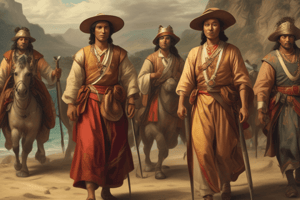Podcast
Questions and Answers
The Cavite mutiny marked a significant shift from previous forms of ______
The Cavite mutiny marked a significant shift from previous forms of ______
resistance
After the Cavite mutiny, smaller uprisings were superseded by broader national movements seeking complete independence from ______
After the Cavite mutiny, smaller uprisings were superseded by broader national movements seeking complete independence from ______
Spain
The Cavite mutiny is considered one of the major events leading to the beginning of the ______
The Cavite mutiny is considered one of the major events leading to the beginning of the ______
Philippine–American War
The Cavite mutiny impacted global affairs during a period of active competition for influence in Asia and Latin America among ______ powers
The Cavite mutiny impacted global affairs during a period of active competition for influence in Asia and Latin America among ______ powers
The revolutionaries during the Cavite mutiny sought political reforms within their own ranks, establishing a more effective system of governing and initiating plans for drafting a new ______
The revolutionaries during the Cavite mutiny sought political reforms within their own ranks, establishing a more effective system of governing and initiating plans for drafting a new ______
The Cavite mutiny led to considerable changes in the Philippines' ______ landscape
The Cavite mutiny led to considerable changes in the Philippines' ______ landscape
Following the initial successes achieved during this period, other groups joined the fight against ______ rule
Following the initial successes achieved during this period, other groups joined the fight against ______ rule
There were several large battles reported across various parts of the country; notably, a battle took place near Biak-na-Bato where Guerrilla tactics played a crucial role in defeating the ______
There were several large battles reported across various parts of the country; notably, a battle took place near Biak-na-Bato where Guerrilla tactics played a crucial role in defeating the ______
In summary, the Cavite mutiny had numerous ramifications ranging from shifts in modes of resistance to alterations in ______ and economics
In summary, the Cavite mutiny had numerous ramifications ranging from shifts in modes of resistance to alterations in ______ and economics
Its significance extended far beyond just being a rebellion; rather, it represented an important turning point in ______ history which influenced how events unfolded thereafter
Its significance extended far beyond just being a rebellion; rather, it represented an important turning point in ______ history which influenced how events unfolded thereafter
These measures set a precedent for future efforts along similar ______
These measures set a precedent for future efforts along similar ______
Flashcards are hidden until you start studying
Study Notes
On November 6th, 1896, the Cavite mutiny was launched by members of the Filipino Revolutionary Army against Spanish colonial rule in the Philippines. This event had wide-ranging implications for Philippine history.
Firstly, it marked a significant shift from previous forms of resistance. Prior to this time, rebellion typically took the form of smaller scale local insurrections with limited goals; however, after the Cavite mutiny, these smaller uprisings were superseded by broader national movements seeking complete independence from Spain. As such, it is considered one of the major events leading to the beginning of the Philippine–American War.
Secondly, the mutiny impacted global affairs. It occurred during a period when European powers were actively competing for influence in Asia and Latin America. Thus, the mutiny garnered international attention and added another dynamic into what were already complex geopolitical relations between European nations.
Thirdly, its effects extended beyond military actions. In addition to fighting the Spanish army, the revolutionaries also sought political reforms within their own ranks. For instance, they began establishing a more effective system of governing the areas under their control and initiated plans for drafting a new constitution.
Fourthly, the revolt led to considerable changes in the Philippines' socioeconomic landscape. After achieving victory over the Spanish forces, the revolutionary government moved quickly to implement sweeping land reforms, a measure aimed primarily at redistributing wealth among different segments of society. These measures set a precedent for future efforts along similar lines.
Finally, the mutiny served as a catalyst for further conflict in subsequent years. Following the initial successes achieved during this period, other groups joined the fight against Spanish rule. There were several large battles reported across various parts of the country; notably, a battle took place near Biak-na-Bato where Guerrilla tactics played a crucial role in defeating the Spanish.
In summary, the Cavite mutiny had numerous ramifications ranging from shifts in modes of resistance to alterations in politics and economics. Its significance extended far beyond just being a rebellion; rather, it represented an important turning point in Philippine history which influenced how events unfolded thereafter.
Studying That Suits You
Use AI to generate personalized quizzes and flashcards to suit your learning preferences.




